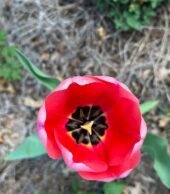Spilling Water Meditation
When our water here
becomes saturated with pollution,
it gets led back to the original water, the ocean.
~Rumi
. . . practicing a less anxious presence, from the sights and sounds of a water glass tipping to experiencing connection with a much wider world . . .
Like other leaders I speak with in the days of COVID-19, I am eager to find and hold a place in myself that allows me to be a steady and comforting presence to those around me. This is what Edwin Friedman, in his book Failure of Nerve: Leadership in the Age of the Quick Fix, calls providing a non-anxious presence. Friedman’s theory suggests that the presence of even a single non-anxious person can ease the tension in a system and, potentially, help a group of people choose a way forward that has integrity beyond reactivity.
I appreciate Friedman’s theory as an assurance of hope and possibility, except for one significant flaw—that I cannot recall many, if any, instances when I, myself, have been entirely without anxiety. The truth is that tough situations and intense conversations raise my discomfort. This discomfort affects my behavior if I am not careful. If I cannot really expect myself to be a completely “non-anxious” presence, then what role is left for me?
Less Anxious Presence
Perhaps the role for me, and maybe even most of us, is striving to be the “least anxious” person in the room. That sounds like a more reasonable leadership aspiration to me. In “striving to be,” I find the wiggle room to explore what Friedman means by becoming an increasingly well-differentiated human being, capable of providing leadership from a grounding in moral principle rather than being swayed by fear and anxiety.
A well-differentiated leader, Friedman might say, tries to be attentive to her own emotional processes, to balance the vulnerability of relationship with the fierceness of responsibility, and to be persistent enough in the face of resistance to really help a system move toward greater integration.
I want to be a less-anxious person in intense circumstances and conversation, and I keep learning that my wanting to be so does not necessarily constitute sufficient change. However, prayer and meditation help me, as do opportunities to speak with others who help me examine and deepen my inner world.
Practicing Difficult Emotions
I noticed something in most of the guided meditations I encountered that differed from my most helpful conversations—they focused nearly exclusively on the positive, encouraging me to enter a places of calm and serenity. Those meditations are often helpful, but in these days of great change, anxiety and uncertainty, I wanted to practice a kind of meditation that might help me engage the potentially difficult emotions themselves.
If you, too, would like to practice becoming a less anxious presence, I invite you try this meditation that I prepared from my own reflection. The heart of the meditation is noticing and waiting with whatever you feel as watch a water glass spilling over. It offers a low-impact way to learn about yourself during in the face of something outside your control. The guided meditation is just over 17 minutes long so you have a enough time to get comfortable and relax. In the meditation I invite you step down into a safe place, to explore your response to potential discomfort, and to experience a sense of connection with others. At the end of the meditation, there are some minutes reserved for bringing you back out of this space gently.
Take some time with me to practice your response to unexpected and difficult things. One meditation may not relieve all the anxiety in ourselves or the leadership situations we face, but a little time in reflection just might make all the difference to your next conversation.
I wonder . . .
- While the glass was wobbling, what did you notice yourself experiencing?
- How did it affect the story to be free of ordinary interventions?
- From your perspective, what was the value of your waters being connected to others?
 Learn more about core Benedictine values.
Learn more about core Benedictine values.






